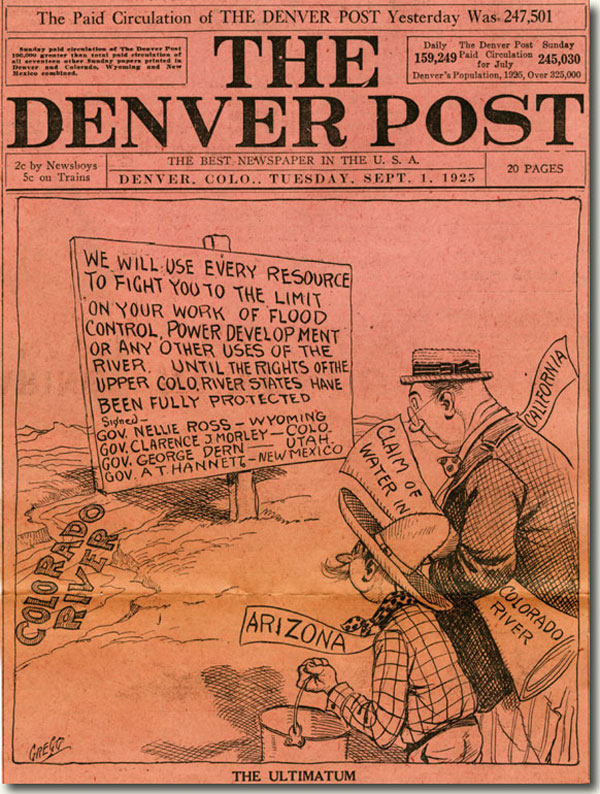
Apr 17, 2018; Los Angeles Times
In the Los Angeles Times, Andrew Khouri reviews the recent press rebellion that emerged in Denver and quickly spread to California, as NPQ covered earlier this week. “Journalists, facing repeated job cuts,” notes Khouri, “are lashing out against investors that they say have strip-mined still-profitable enterprises and pocketed the money.”
The press rebellion first broke out earlier this month at the Denver Post, which, in response to a 30-percent cut in staff—only the latest in a series of cutbacks over the previous few years—took the extraordinary action of printing an editorial on its pages that effectively called for Alden Global Capital, the hedge fund that owns a 50.1 percent share in the paper through the firm Digital First Media, to either reinvest or get out. “Denver deserves a newspaper owner who supports its newsroom. If Alden isn’t willing to do good journalism here, it should sell The Post to owners who will,” the Denver Post editorial board wrote.
Digital First Media owns nearly 100 newspapers nationwide. In California, Khouri explains that, “The company, in various forms over the years, scooped up many of the papers in Northern and Southern California and became known for aggressive cuts and sharing reporters across publications. Two years ago, it purchased the Orange County Register and Riverside Press-Enterprise … SCNG now has more than 20 weekly papers and 11 dailies, including the Long Beach Press-Telegram, the Riverside Press-Enterprise and the Daily Breeze in Torrance.”
With respect to the Denver Post’s call for Alden to reinvest in journalism or get out, Neil Chase, who is executive editor of Digital First’s [San Francisco] Bay Area News Group, which includes the San Jose Mercury News and the East Bay Times, wrote that, “The union that represents our employees has been saying the same thing for months. They’re right.”
Sign up for our free newsletters
Subscribe to NPQ's newsletters to have our top stories delivered directly to your inbox.
By signing up, you agree to our privacy policy and terms of use, and to receive messages from NPQ and our partners.
Khouri notes that, “At its peak size in the 1990s, the Mercury News had a newsroom staff of 440, according to the Pacific Media Workers Guild. The newsroom as of January had only a staff of 39 represented by the Guild, with some additional non-union staff.” San Jose, by the way, is the nation’s tenth-most-populous city, with a population that exceeds one million people. It is also located in the heart of Silicon Valley, home to the world’s wealthiest community foundation, with $13.5 billion in assets. Even with all of the economic challenges that the newspaper industry faces in the digital age, the idea that San Jose can only support a newspaper with a guild staff of 39 is, simply put, astonishing.
The Denver Post editorial may have lit the match that set off the current press rebellion, but discontent has been brewing for some time now. “The dual threat to jobs and quality journalism has spurred union drives at papers across the country, including one at the Los Angeles Times, in which journalists this year overwhelming voted to join the NewsGuild-Communications Workers of America,” Khouri recalls. Also, in a lawsuit filed in March, a minority shareholder in Digital First alleged Alden has used the publisher’s money to make investments that would benefit Alden and are unrelated to journalism.
There’s more. A recent article by Ken Doctor in NiemanLab notes that nationwide there are now no more than “25,000 journalists in the more than 1,300 dailies across the country.” Doctor adds, that the uprising of journalists is connected to other prominent emerging protest movements. “In a time of red state teachers madly striking, of fast-food workers demanding $15 an hour, of #MeToo and #BlackLivesMatter activists refusing to go away—it looks like our time could represent a cultural turn of its own,” Doctor writes. Citing Parkland shooting survivor Emma González, Doctor calls the Denver Post editorial journalism’s “calling BS” moment.
Frank Pine, who is executive editor of the Alden-owned Southern California News Group, has also called for new ownership. Pine also identified nonprofit ownership as a possible way out. In an interview with Khouri, Pine notes that the article he wrote and those of his colleagues “were meant to explain to readers why subscription prices have gone up while page counts have gone down, as well as the effect of having fewer professional watchdogs in their communities.”
“With fewer reporters, we provide less local reporting,” Pine adds, “Communities that used to get three or four stories a week may now only get one.”—Steve Dubb











